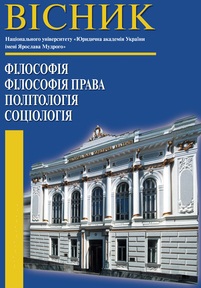СПЕЦИФІКА РОЗРОБКИ КУРИКУЛУМУ В СУЧАСНІЙ ОСВІТІ ТА ІННОВАЦІЙНИЙ ПОТЕНЦІАЛ КУРИКУЛЯРНИХ ПРОПОЗИЦІЙ
SPECIFICITY OF CURRICULUM DEVELOPMENT IN MODERN EDUCATION AND INNOVATIVE POTENTIAL OF CURRICULUM PROPOSALS
Author(s): Georgy Ivanovich FininSubject(s): School education
Published by: Національний юридичний університет імені Ярослава Мудрого
Keywords: curriculum; hidden curriculum; formal curriculum; philosophy of the curriculum;
Summary/Abstract: Problem setting. The innovative potential of curriculum proposals has enormous potential for achieving the goals of the national educational system such as the training of young people for independent living and professional activity as patriotic-minded people focused on humanistic values that are capable of achieving their goal and its critical assessment. To implement the innovative potential of curriculum proposals accumulated by the educational systems of the leading countries of the world, which are an important component of the modernization of the modern educational system, a scientific analysis of their capabilities and potential is required.Recent research and publications analysis. There are a considerable number of scientific works devoted to the problem of the issue of the theory and practice of curriculum development in modern education, the reform of education and the modernization of its meaning to modern problems of training a modern specialist. So, the mentioned problems are reflected in the works of M. Kultaieva, N. Radionova, M. Tryniak, S. Klepka and others. At the same time, in spite of a sufficiently wide range of publications, the study of the role and importance of using the innovative potential of curricular proposals in modernizing the modern education system cannot be regarded as exhausted.Paper objective. The purpose of the article is the determination of the specificity of curriculum development in modern education and the innovative potential of curriculum proposals.Paper main body. The term curriculum is used in English-speaking countries, and the term Lehrplan is used in Germany and in Ukraine. The philosophy of the curriculum, which is spread in the Federal Republic of Germany, focuses on regulating and systematizing of the content of learning when the aims of separate disciplines are agreed with the general purpose of the educational process. Planning is an important point in developing of curriculum as a didactic construct and defines the sequence and duration of mutually agreed educational processes. In the American tradition the philosophy of the curriculum includes not only the optics of the agents of the educational process, but also the optics of its addressees, especially students. The American philosophy of the curriculum is based on the principles of pragmatism and analytic philosophy. It focuses on the methodological and procedural points of the disciplines which are studied. Unlike the German curriculum constructs, the American conceptualization of the curriculum focuses on the methodology and elementary forms of material processing. It determines the intensification of the curriculum, the accumulation of such a resource as a hidden curriculum, includes personal knowledge, social learning and relevant educational and educational practices. Such curriculum is the most suitable for modern education, since it is oriented towards the consistent modernization of educational practices, while not leaving the educational doctrine of the country. The strategy of its construction is specified in the following steps: research, development and implementation. At the research level the contribution to the development of the curriculum is widely used the multidisciplinary approach. At the level of development the selection of accumulated material is carried out by the theoretical and practical managers, they improve the curriculum and the educational and pedagogical practices envisaged therein in pilot projects and testing procedures, guided by the officially recognized educational goal. At the level of implementation the curriculum is approbated in the relevant educational institutions, and amendments and clarifications are made to improve the training of modern specialists. Implementation is an equally important step in constructing of a curriculum as a project of a new educational reality.Conclusions of the research. Thus, the consideration of this problem leads to the need to more actively use the innovative potential of curricular proposals accumulated by the educational systems of the world’s leading countries. The main means of implementing the requirements of society to modern education and state educational standards in the process of training specialists is curriculum, which is used in the broad and narrow meaning of the word. The phenomenon of the hidden curriculum and the interaction of the "formal curriculum" associated with the openly stated goals and values of learning and the "hidden curriculum" requires further study.
Journal: Вісник НЮУ імені Ярослава Мудрого. Серія: Філософія, філософія права, політологія, соціологія
- Issue Year: 40/2019
- Issue No: 1
- Page Range: 86-95
- Page Count: 10
- Language: Ukrainian

